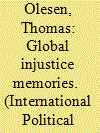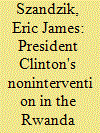| Srl | Item |
| 1 |
ID:
130911


|
|
|
|
|
| Publication |
2012.
|
| Summary/Abstract |
Within a relatively short span of time, and culminating with the tenth anniversary of the genocide in 2004, the 1994 Rwanda genocide has become a key global injustice memory. At the core of this process is a double-sided conception of injustice: on the one hand, the genocide in itself clearly constitutes a major injustice; on the other hand, injustice claims have been expanded to encompass actors outside of Rwanda who observed the horrors without instigating sufficient action to halt, or at least mitigate the effects of, the unfolding genocide. It is the fact that moral and political responsibility for the genocide has been so powerfully expanded to third parties in a spectatorship position that most vividly testifies to the global character of the Rwanda injustice memory. The article identifies and analyzes four areas in which the transformation of the Rwanda genocide from national event to global injustice memory has occurred: institutionalization, expressions of regret, analogical bridging, and cultural products. The article argues that the transformation of non-Western events into global injustice memories has so far been insufficiently explored within International Relations and global political sociology.
|
|
|
|
|
|
|
|
|
|
|
|
|
|
|
|
| 2 |
ID:
082292


|
|
|
| 3 |
ID:
183734


|
|
|
|
|
| Summary/Abstract |
This research analyzes Clinton's decision to not intervene in the Rwandan genocide. The methodology used is a historical analysis and interpretation of primary and secondary source material. Clinton admitted that not intervening in the Rwandan genocide was one of the greatest regrets of his presidency. There was not a substantial amount of domestic support for an intervention into Rwanda and Clinton did not attempt to use his influence to change that disposition. Clinton did not attempt to change domestic sentiments due to his priorities of reduced funding for foreign operations and the avoidance of ‘mission creep.’ The most common fault in the current historiography is the claim that Clinton did not intervene in Rwanda because of the failed mission that had recently occurred in Somalia, which does not align with the available evidence. Upon leaving office, he accepted ownership of his poor decisions and expressed sincere regret.
|
|
|
|
|
|
|
|
|
|
|
|
|
|
|
|